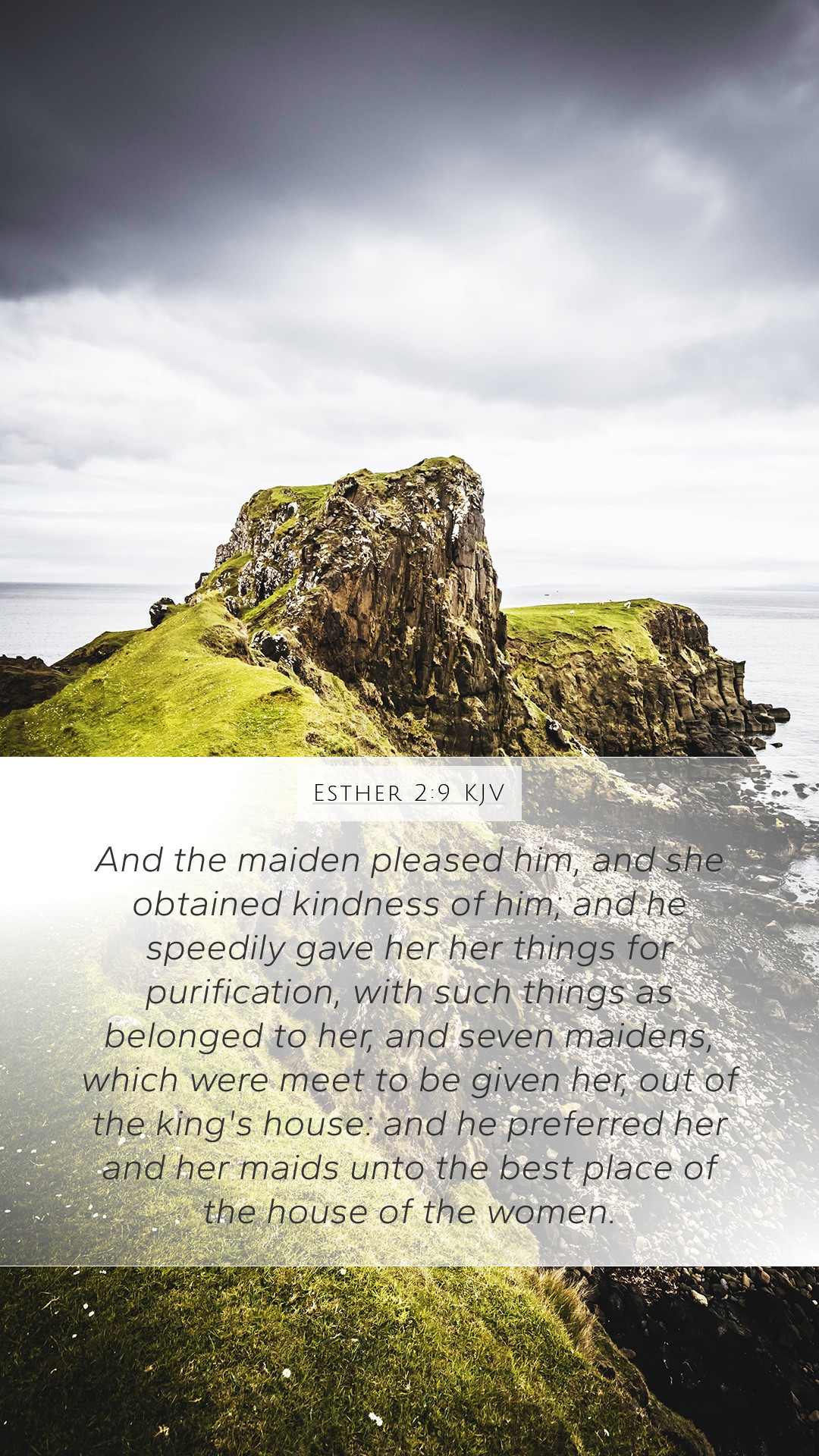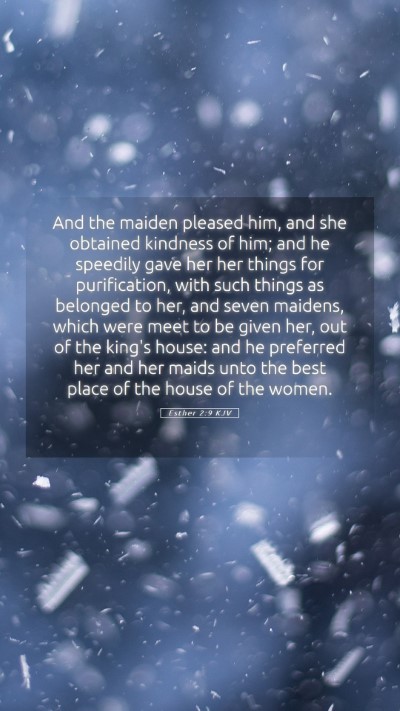Old Testament
Genesis Exodus Leviticus Numbers Deuteronomy Joshua Judges Ruth 1 Samuel 2 Samuel 1 Kings 2 Kings 1 Chronicles 2 Chronicles Ezra Nehemiah Esther Job Psalms Proverbs Ecclesiastes Song of Solomon Isaiah Jeremiah Lamentations Ezekiel Daniel Hosea Joel Amos Obadiah Jonah Micah Nahum Habakkuk Zephaniah Haggai Zechariah MalachiEsther 2:9 Meaning
What is the meaning of Esther 2:9?
And the maiden pleased him, and she obtained kindness of him; and he speedily gave her her things for purification, with such things as belonged to her, and seven maidens, which were meet to be given her, out of the king's house: and he preferred her and her maids unto the best place of the house of the women.
Esther 2:9 Bible Verse Meaning
Understanding Esther 2:9
Esther 2:9 reads:
“And the maiden pleased him, and she obtained kindness of him; and he speedily gave her her things for purification, with such things as belonged to her, and seven maidens, which were meat to be given her, out of the king’s house: and he preferred her and her maids unto the best place of the house of the women.”
Overview of the Verse
This verse appears in the narrative of Queen Esther, encapsulating significant themes of favor, preparation, and the unfolding purpose of God in Esther’s life during a time of national crisis for the Jewish people. The key elements involve the maiden (Esther) gaining favor with Hegai, the keeper of the women, highlighting both divine providence and human agency.
Verse Analysis and Commentary
Insights from public domain commentaries shed light on several aspects of this verse:
-
Matthew Henry's Commentary:
Henry emphasizes that Esther’s beauty and grace gained her favor in the eyes of Hegai. He notes that this was part of God’s providence and preparation for Esther's eventual queenly role, suggesting that God orchestrates the circumstances that lead to His purposes. The reference to her needing purification rituals signifies the importance of holiness and preparation for service, which resonates with the broader biblical theme of preparation for divine tasks.
-
Albert Barnes' Notes:
Barnes points out the rapid response of Hegai in providing everything Esther needed, which illustrates the delight of authority in recognizing those who possess exceptional qualities. The act of giving her seven maidens symbolizes the honor conferred upon her, highlighting the importance of preparation to meet the standards required for the king's court. He also notes how this act of favor foreshadows Esther's pivotal role in saving her people.
-
Adam Clarke's Commentary:
Clarke elaborates on the cultural context of Esther’s preparations, noting that the purification rites reflect ancient customs that were spiritually and physically necessary. He also highlights the significance of the “best place of the house of the women,” indicating Esther’s rise in status and importance. Clarke underscores the idea that Esther's humble beginnings did not hinder her from attaining greatness through favor rooted in God's plan.
Thematic Implications
This verse can be interpreted through various thematic lenses that contribute to the broader Bible verse understanding:
-
Divine Providence:
Throughout the Book of Esther, God's guiding hand is subtly present, suggesting that even in seemingly mundane circumstances, His plans for His people unfold. Esther’s favor is a reminder of the often hidden ways in which God orchestrates history.
-
Preparation for Service:
Esther's preparation reflects a critical spiritual truth that believers must undergo processes of growth and purification to fulfill God’s calling. The ceremonial preparations foreshadow deeper spiritual readiness.
-
Role of Favor:
This narrative illustrates the importance of favor in leadership and influence, highlighting how God can place individuals in strategic positions for His purposes.
Application of Esther 2:9
The practical applications derived from Esther 2:9 can guide personal and community Bible study insights:
-
Trust in God's Plan:
Just as Esther trusted the process leading to her elevation, believers are encouraged to trust in God’s unfolding plan for their lives, especially during challenges.
-
Embrace Preparation:
Emphasizing the significance of personal and spiritual preparation, this verse reminds Christians to actively seek growth and readiness for God’s calling.
-
Recognize God’s Favor:
The recognition of favor can instill confidence and a sense of purpose, urging individuals to acknowledge the small victories that align them closer to their divine destiny.
Related Scripture References
Esther 2:9 can be cross-referenced with several other passages that complement its themes:
- Esther 4:14 - God’s purpose for Esther and the calling to use her position for the benefit of her people.
- Proverbs 16:7 - The principle that when a person's ways please the Lord, He makes even their enemies to be at peace with them.
- Psalms 75:6-7 - The exaltation comes from God, which aligns with Esther's experience of rising to prominence.
Conclusion
Esther 2:9 serves as a powerful reminder of how God’s hand works in the lives of those who trust Him and prepares them for significant roles. Through understanding this verse, believers are inspired to recognize the ongoing guidance of God, the importance of readiness in faith, and the ultimate fulfillment of His divine purposes.
Further Study
For those interested in diving deeper, consider engaging with Bible study groups or utilizing various Bible study tools to explore the richness of the surrounding texts and discover the broader themes present throughout the Book of Esther.


